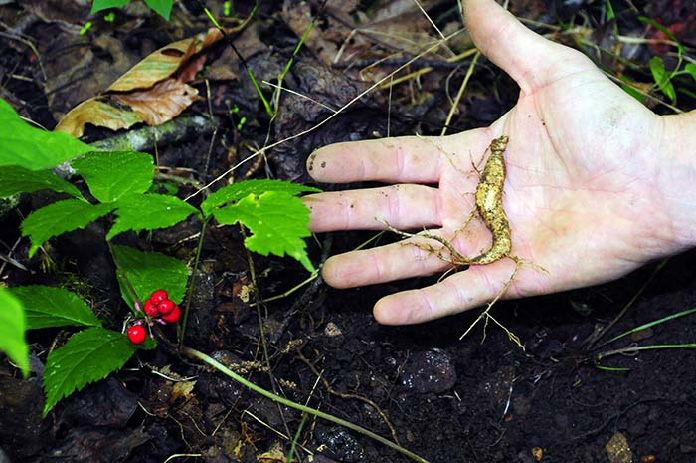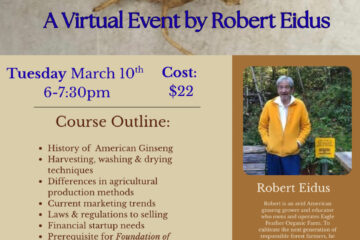
By Carter Patterson, Environmental Sciences student, University of North Carolina –
Have you ever been walking through the woods of western North Carolina and happened upon a small plant that looked to be a Hickory tree sapling but with red berries?
My guess is that you probably haven’t. But if you were to go back to the 1600’s, this plant would be all over the temperate forest floor.
The plant described above is known as American ginseng, Panax Quinquefolius, a very important plant that has been used by humans for medical purposes all throughout time. Due to human overharvest, ginseng populations across the eastern United States have experienced a massive decline since European settlement and will disappear completely in the wild if the rate at which ginseng is being harvested does not decline in the near future.
Ginseng has been used as an all ailment cure for hundreds of years. The Cherokee were using it before the Europeans made the sail across the Atlantic, and once the Europeans realized the similarities to its asian sister species, Panax Ginseng, a revolutionary trading system began to arise. In the 18th and 19th centuries, American ginseng was America’s second leading trading product, with only fur being traded in higher volumes. This massive trade system from the United States to China is what initialized the decline of ginseng in the eastern wilderness; unfortunately, this trade is still active and strong today.
While researching North Carolina’s policies and approach to this decline, the North Carolina Ginseng Association was quick to pop up. Founded in 2013 by Robert Eidus, a passionate ginseng enthusiast and expert from New York, the NC Ginseng Association is an organization whose goal is “to produce organically grown ginseng in the woods (forest farming) in America for Americans.” After speaking with Mr. Eidus, the severity of this relationship between humans and declining ginseng became clear; American ginseng is in trouble in the state of North Carolina.
Eidus began the conversion by talking about how the current ginseng market prices are run by Chinese growers, who have more interest in profit than species preservation. This leads to corrupt and exploitable policies in the market: one being that ginseng needs to be just 5 years old to harvest.
“The legal age of ginseng to harvest is 5 years, which helps the Chinese because they can get more ginseng at a faster rate. However, West Virginia study shows the full complement of ginsenosides are not fully produced until year 7 which means that these plants need more time to grow before harvesting for the full medicinal benefit.”
It is this type of misinformation and greed that leads to the ignorant poaching of this marvelous plant. In 2014, the History Channel released a reality TV show called “Appalachian Outlaws” that highlighted a group of ginseng diggers in the eastern US and influenced many citizens to go into the woods to harvest some of their own ginseng for personal profit. However, these people were not following laws and protocols that the government has set out on ginseng harvest. Eidus claims that “[‘Appalachian Outlaws’] ripped more ginseng out of the ground than any other single event in history.” The problem of poaching did not stop after the show ended, but, even today, the majority of wild ginseng is dug out of the ground by poachers who just want a little cash.
This problem can be stopped if policy makers knew more about the plant that they are trying to protect. Eidus claims that they sit up in their office in the Triangle and do not go out into the field which leaves them using “twisted logic” in their decision making with regards to regulating ginseng harvest.They can see the fact that the ginseng production is decreasing but fail to see why their policies are not working. Eidus has talked with the North Carolina Plant Conservation and pushed for a license requirement, similar to the licensing process for hunting and fishing, to harvest ginseng but they simply won’t listen to him or to anyone who is actually in the field seeing the effects of poachers.
“They have created more problems than helped since the CITES (Convention on International Trade in Endangered Species of Wild Fauna and Flora) treaty was signed in 1977.”
Eidus argues that policy on ginseng digging has to change but before policy can change, the general public and newcomer ginseng diggers have to change their outlook on this species of life. Because this is a small plant, and not a big mammal such as a deer or bear, ginseng doesn’t seem to be at the top of the list of concerns in America. However, this is not fair to the plant. Humans, all too often, view themselves as a higher being that is greater than the rest of the life on this planet. We use and destroy so many species for our own benefit, but those plants and animals have the right to live just as we do. Creating a mindset of respect for the plant is something that is important when sustainably collecting it for medicinal use. Ginseng owes us nothing, but yet it is giving us these medical properties and we must use what we are given in a sustainable fashion without harming the species as a whole.
When asked if he had any hope for this species in North Carolina, Robert Eidus responded with a hasty “no.” But he then went on to say that if there is rapid change in the near future then there is a slight chance to turn the wild ginseng populations around. It starts with education of the public and policy makers to realize what is actually happening to this plant and what it takes to replenish it.
“What has worked in the past is obviously not the solution.”
This article is meant to act as a message to the policy makers in North Carolina as well as to anybody who is looking into collecting ginseng themselves. We must come together as a community, educate ourselves with facts, and respect this plant as the magnificent form of life that it is. As Robert Eidus told me, we must all “WAKE UP!” and protect this species from wild extinction.
As for myself, I have hope for the future of this species as I believe humans are capable of helping a species just as easily as they can hurt one.
If you want to help, you can join the NC Ginseng Association on Facebook or get involved with local plant conferences to help spread awareness of the need for policy change.
Sources:
- History, Conservation, and Cultivation of American Ginseng, North America’s Most Famous Medicinal Plant (https://link.springer.com/chapter/10.1007/978-3-030-44930-8_6)
- In Defense of Plants Podcast: American Ginseng Revisited (https://podcasts.apple.com/us/podcast/ep-381-american-ginseng-revisited/id1245995247?i=1000575276926)
- What is CITES? (https://cites.org/eng/disc/what.php)
- Appalachian Outlaws (https://www.history.com/shows/appalachian-outlaws)







